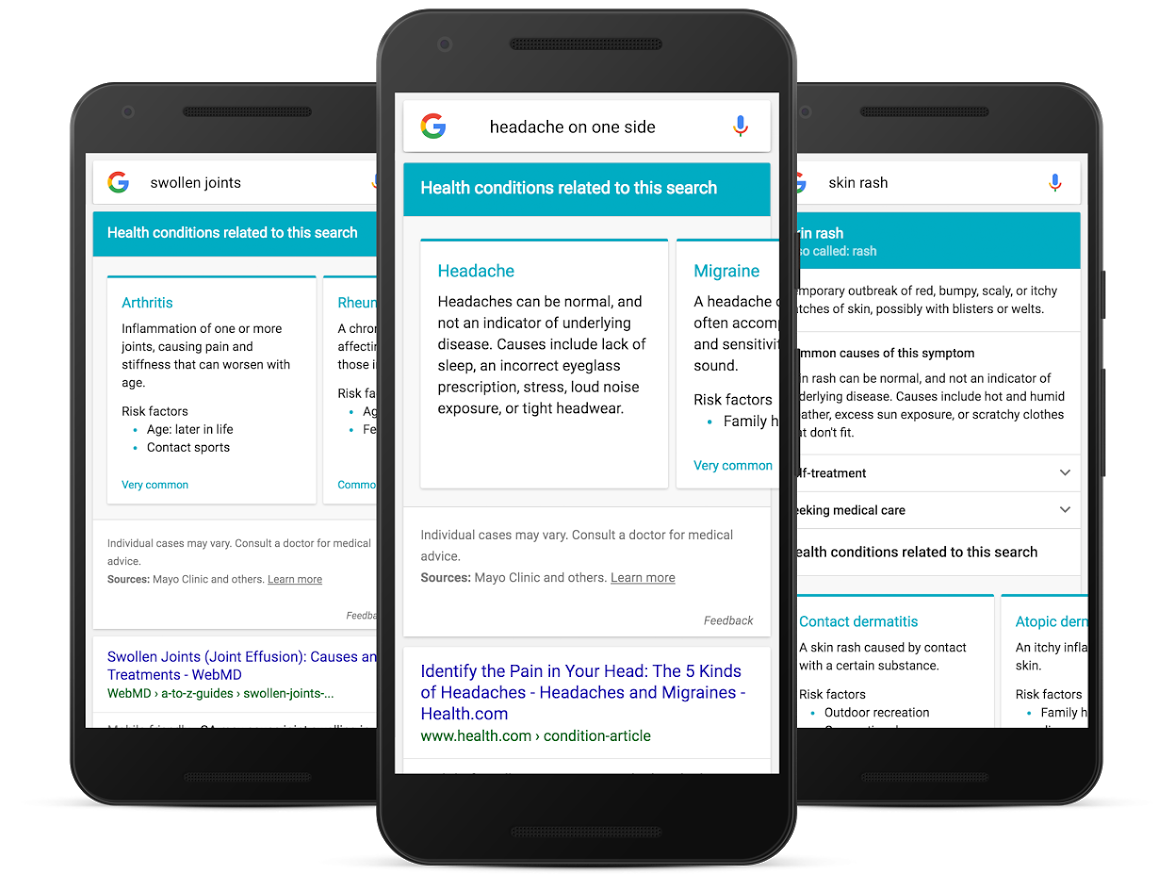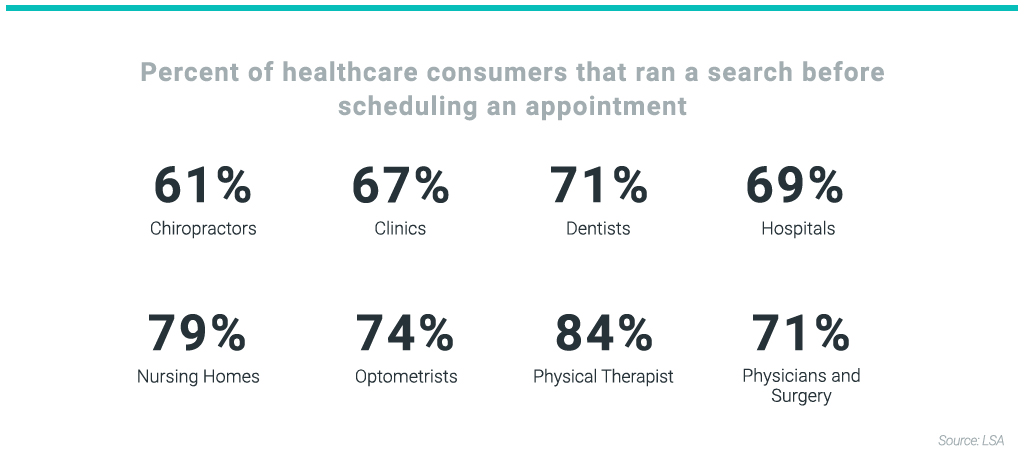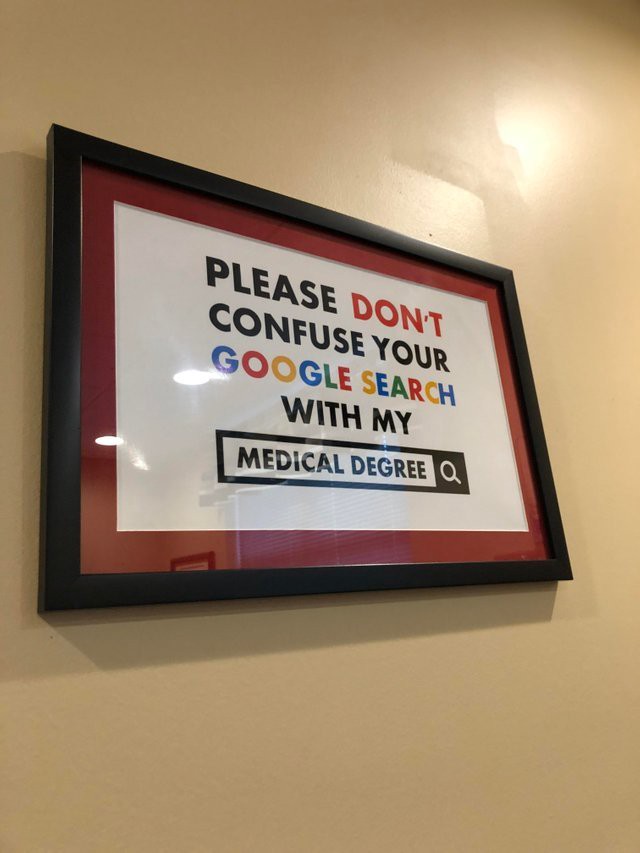
Whatever symptoms you put in, there may always be a result that will say it’s related to cancer.
Image by kropekk_pl from Pixabay
The interesting and certainly quite ironic reality of today’s time is that there is a dire requirement in each and every individual to be performance-oriented at all times.
‘Success’ is precariously balanced on the fulcrum of good health, wellness, and an intensely energetic profile. The bottom line, however, is that the mirage of optimum productivity, which is the universal object, is in fact, hinged on the pivot of human resources. These are also the times when the overload of available information and sketchy details of the pursuit of wellness practices have descended on the human race like an avalanche.
Put in a nutshell, Dr.Google dictates it all!
Obviously, the belief that one is sufficiently equipped to manage one’s own health is now stronger in one’s perspective than ever before. This has led to individuals resorting to the extremely detrimental and even self- destructive practices of imagining that without adequate expertise and proficiency training, the role of a medical practitioner can be enacted with ease or efficiency.
Google is not God.
Just because Google is omnipresent, infinite, and answers every question you ask, it doesn’t make it God.
Google as the all-pervading search engine is both handy and accessible. It is also a convenient and lucid place for answering all queries and even clearing all doubts, about, as they say, anything ‘under the Sun’. What more, as a boon to the common man….it is FREE and has become an indispensable part of our lives.
Hence, it is important to distinguish between the two nodal terms…’Information’ and ‘Knowledge’.
Simply put, the aim of the information is to make available details about an unknown topic or query in a very basal and argumentatively trivial manner, with the aim of appeasing curiosity.

Source: Google
It has been estimated that every minute there are approximately 70,000 health-related searches on Google and a billion daily searches on health. For example, close to 40 percent of Australians look for online health information for the purpose of self-treatment and 80 percent of them look for medical information about diseases and symptoms online.
Over 100 million Britons consulted Dr.Google just last year and about 10 percent of the searches were related to mental health with ‘anxiety’ being one of the most popular searches.

It is definitely not knowledge and wisdom which has been imbibed in the resource through a protracted investment of dedicated time and proficiency. Moreover, unless one is careful, a lot of Dr.Google’s offerings are not backed with very empirical scientific evidence or basis as these tools that claim to be helpful in finding out what may be causing your symptoms, are unreliable and sometimes even dangerous. Interestingly, the reader is gently guided through FAQs…It is almost as if the answers and solutions given are what Google wishes to tell rather than what the reader wishes to know either giving them a sense of false security or fear.
A recent survey showed that symptom checkers available online are only accurate about a third of the time.
When to Google and when to see a Doctor.
Let’s first admit to the fact that we have all googled health conditions and symptoms at some point. Either for ourselves or for someone we care about. It’s also a fact that Dr.Google at some point led us to doubt the worst and almost convinced us that we might have cancer or even a brain tumor. OK if that is an exaggeration, we were definitely made to believe that we might be coming down with something terrible.
We could have a stomach ache and start searching for similar experiences online. Remember only those who have a serious disease or maybe malignancies post their problems online and these stories make us believe, we have it too.
If the first 50 results show what you have been suspecting all along, then nothing is going to stop you from believing that you have a serious condition. You see, it is the confirmation bias at play. All this will now make you want to hear what you believe is correct from your doctor. Any ‘other’ version offered by your doctor will be disregarded, making you seek multiple opinions until the diagnosis is in sync with what you made.
It actually works both ways. Those with a serious condition may be wrongly made to believe that they have a benign problem.
The pandemic made this even worse with people googling symptoms of cough, and cold. This internet caused anxiety also known as Cyberchondria has in fact caused more harm as worry becomes its own illness.
The web is inundated with unvetted and unregulated health information that patients are not aware of, so consult a real doctor when you feel unwell.
Dr.Google is not a real doctor.
There is enough data to suggest that patients are comfortable trying to find medically relevant information for the purpose of self-management.
Certain websites are suspect in their credentials and the exercise of ‘net-search’ or what to look on the information highway and how to find it….is indeed a skill one has to acquire.
First, basic health literacy is a must to google medical information online. There is no harm in getting to know your symptoms better and trying to understanding your problem after the diagnosis is made by a doctor.
Symptom checkers for example have proven useful during the pandemic as more people are now aware of the virus.
Doctors are trained to consider your family history, your social circumstances, your previous illnesses, your habits, medications you take, and many other things before they make a diagnosis or give out any advice.
Remember, unlike a doctor, Google does not take into account your overall medical health and history and throws up generic results based on your searches. And Google’s algorithms are not medically trained to diagnose your condition.
It is true that Google has been useful to some people with unique conditions that helped with an accurate diagnosis which in turn led to seeking timely help. Searches made by experts or those medically qualified usually yield better results.
Is it ok to argue with your doctor?

Source: Twitter
Is it unfair to question a doctor about his expertise? But how do you know if the doctor is updated with the latest research and developments in the field? What options do you have if a doctor doesn’t have the patience to sit with the patient and answer his questions? But again, is it wise to argue with a doctor with superficial knowledge you gained a few days ago? These are all good questions.
Asking questions is fine but arguing is not. A doctor can spend limited time with his patients given that he has other patients waiting. It is not a great experience for any doctor being quizzed by ‘Google prepped’ patients who are ready to hear, but only what they want to hear.
A doctor is expected to answer questions but limited to those relating to the drugs advised, side effects, drug interactions, etc. It is foolish to argue with a doctor based on the information you gathered through some research you did online a few hours or days ago.
If you are curious you could ask questions like -what do you think about this recent research that has been published? Prepare a list of points you gathered and ask the doctor what his opinion is.
Why have we started Googling health symptoms in the first place?
Now, coming to the focal aspect of Dr. Google and strangely health management, let’s begin with some frank questions to ourselves. Have doctors become an endangered species? Has there been an important event in our lives which we did not even notice? The extinction of the General Practitioner or colloquially GP! Is it now a fact that the quintessential family doctor is now an entity of the past? Or do we truly feel that doctors are too busy to update their medical knowledge? If the answer to all these pointers is affirmative then we cannot blame the advent of the web-based culture completely.
In recent times, we the laity, have collectively and singularly seen the single-minded demolition of ‘Noble’, ‘Dedication’, and ‘Vocation’ as adjectives to describe the Medical Profession.
It is a reality that there abound self-projected medicos with questionable and doubtful qualifications and even ethics. This has resulted in a loss of faith in the minds of common people and a certain cynicism about this community which was revered and held in high esteem at one time. To prod, the seemingly lost conscience, some to totally disillusioned people have even been forced to ask…Have medicos forgotten the Oath of Hippocrates? A question which could brook a heated argument of sorts.
Some other parallel occurrences in the larger plethora of things cannot be ignored. Almost as parlance, for many years allopathy was the synonym to curative medicine. However, for some years now, the not so positive aspects of this regimen have surfaced and are available for all and sundry to mull upon. Allergies, contraindications of drugs, the myopic approach of quick fixes, and the totally appalling hospital and doctor nexus…a vortex which tends to suck the patient and his family into the black hole.
Hence, ancient Vedic practices have been revisited, preventive rather than curative stance has been taken as valid, and Alternative Medicine Regimens and Complementary Healthcare have emerged in the centerfold. This includes Ayurveda, Unani, Homeopathy, Siddha, Naturopathy, and many others.
I wish to caution the reader at this stage that every aspect talked about in the early part of my treatise holds good for this facet of disease management. I include the savoury and not so appetising role of Dr.Google, the cloudy profiles of practitioners of medicine, and even the information and knowledge divide. Hence, further to this, for the sake of convenience, I would be using the epithet “Doctor” as a generic reference.
Now that the undesirable degeneration of the doctor-patient equation has been somewhat established…… What is the solution?
I think that like a delicately poised Libra, both Sides have to be addressed in a direct, univocal, and sustainable manner. Let us begin with Doctors….there are several areas of concern in their professional arena which have to be transparent.
A simple, easy to comprehend, and highly doable checklist spotlight being Doctors…
Doctors must…
- Present their credentials without a sense of outrage as in a way it is the patient’s “Right to know”
- They have to recognise that healthcare, in the present context, is hinged on value-addition and Continuous Proficiency Enhancement. Hence, educational pursuits and ongoing global updating are the order of the day. Naturally, these have to carry impeccable credentials themselves to be truly upheld.
- In the novel and contemporary approach to Patient interaction, emotional connects with the patient are being treated as paramount.
- Hence, CMEs (Continuing Medical Education courses) for Patient Counseling are a compulsory component of a ‘Real’ doctor’s portfolio.
- The role envisaged for doctors must be that of as a facilitator with an inclusive stance to the treatment procedure. It is quite clear that a patient wishes to be kept abreast of the nuances of both his condition and its curative approach. A feeling of being “left out” would be detrimental to his response to the treatment and his confidence in the Doctor.
- There has to be a valid and accurate projection of ethics and transparency in the approach towards the patient.
- An emphatic understanding of peripheral aspects of health and wellness is a must for the doctor. The human body has to be seen as a single entity and hence, the perspective of the doctor has to be holistic wellness focussed.
- It would be quite conducive to the patient’s positive mind-set if the doctor agrees to provide lucid literature and educational and reference material on the disease.
- It follows that there is a dire need for exemplary content in the area of ‘popular’ clinical sciences.
- A veritable step to be taken by doctors would be to ask for feedback and endorsements from patients. The analogy may be seen as a bit crass, but if the doctor is a “brand” then this would definitely enhance “brand loyalty”.
Interestingly, all the aspects dealt with above most definitely come under the purview of Good Clinical Practices.
Now, let us address the other pan of the Libra….the patient’s role…his behaviour, his mentality, and his ethos in its complete dimension.
The Patient must…
- Foremost to his interaction with the doctor, he must recognize that his curative process is, in fact, lifestyle intervention and must reveal all aspects of himself in totality including habits, work culture details, and psychosomatic areas of his personality.
- It would be extremely useful and beneficial to have a record of his own clinical history and such a file is viewed by all doctors as a touchstone to good health.
- He must follow instructions about dosage, contraindications, and dietary restrictions given by the doctor to the Tee!
- Above all, he must have an explicit and unquestionable quantum of trust and faith in the proficiency of the doctor.
- Case studies have shown an appalling trend in the New Age Patient where he feels that to question the doctor, albeit mindlessly, is a done phenomenon.
- If there has to be a focussed journey to wellness, there is a dire need to understand the psychosomatic fulcrum. This implies that the body cures itself if the mind believes and has faith in the curative procedure. Definitely no argument with doctors vs Dr.Google, whatsoever.
The ideal relationship model between the doctor and patient is a no gradient relationship, both are equally poised and enjoy mutual respect and regard for each other.
An apt analogy is the synergy of a teacher and learner in the premise of educational pursuits. Symptoms of an illness are often confusing and misleading, hence, the tetrahedron of aetiology has to be conformed to…a best practice is to leave it in the hands of a ‘Good Doctor’.
A patient has to avoid quick fixes and never be too busy for one’s own health. One must pay attention to the doctor’s instructions and note foods and other drugs to avoid during treatment. He must have patience since curative procedures are gradual and need time.
It is only then that medical practice would again be as flawless as in the times of Sushruta and Hippocrates would then reemphasize ‘Let Food be thy Medicine’.
What more…Many a modern-day Doctor would pronounce the age-old cliché
“Apple a day, keeps the Doctor Away” …with both confidence and a sense of security.
The author acknowledges the use of authentic medical literature to structure this article.
Sign up for the QuackTrack.org newsletter below!















Dhriti
October 15, 2020 at 9:55 pm
Indeed an eye opening article for our googled generation. Thank you Dr Vora for a perspective that matters.
Kiran K Kulkarni
October 16, 2020 at 8:30 am
In Indian contex, referring Dr Google becomes even more risky when practically all medicines are sold over the counter w/o Doctor’s prescription.
Mehroosh
October 16, 2020 at 2:33 pm
You are absolutly right docter . Google search only puts in depresssion because we feel the same for we have searched and the reality is totally different . Thanks for this article